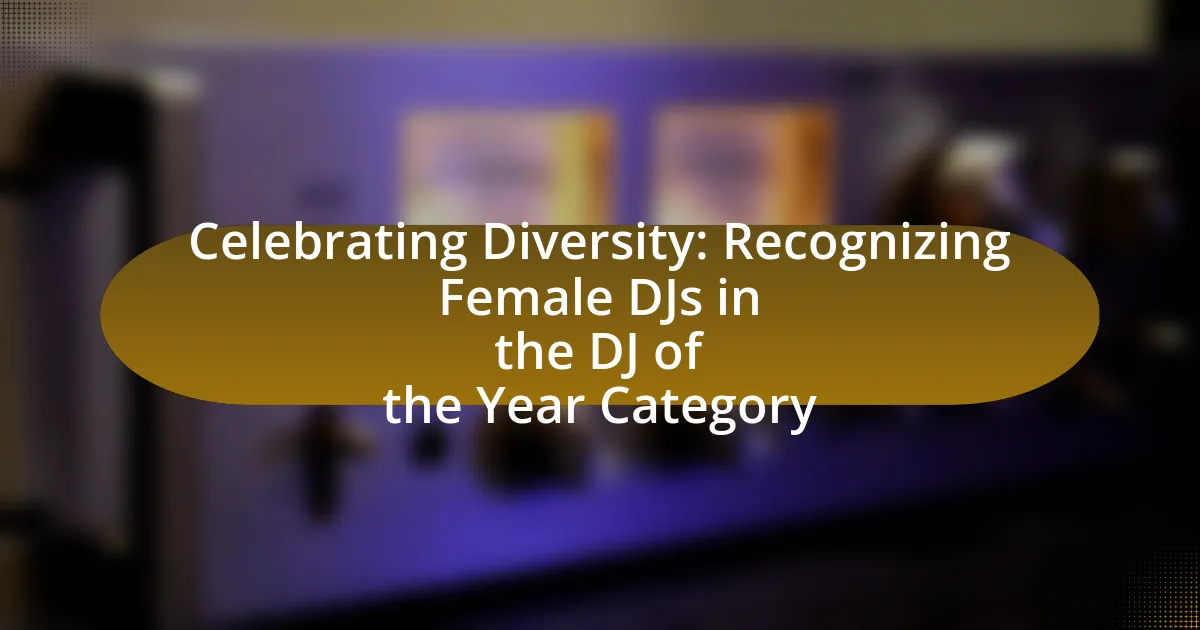The article focuses on the significance of celebrating diversity within the music industry, particularly highlighting the representation of female DJs in the DJ of the Year category. It discusses the importance of diversity in fostering creativity, innovation, and audience engagement, while addressing the challenges female DJs face in a male-dominated field. The article also examines the evolution of female representation in the industry, the impact of initiatives supporting female DJs, and the criteria for recognizing talent through awards. Additionally, it outlines practical tips for aspiring female DJs to succeed and emphasizes the need for continued efforts to improve recognition and opportunities for women in music.

What does it mean to celebrate diversity in the music industry?
Celebrating diversity in the music industry means recognizing and promoting the varied backgrounds, cultures, and identities of artists and audiences. This celebration fosters an inclusive environment where different musical styles, perspectives, and experiences are valued and represented. For instance, initiatives like the recognition of female DJs in the DJ of the Year category highlight the importance of gender diversity, addressing historical imbalances in representation. Research shows that diverse teams in creative fields lead to more innovative outcomes, underscoring the significance of inclusivity in music.
Why is diversity important in the DJ community?
Diversity is important in the DJ community because it fosters creativity and innovation, leading to a richer musical experience. A diverse group of DJs brings varied cultural influences, styles, and perspectives, which can enhance the overall quality of performances and broaden audience appeal. For instance, research from the University of Southern California highlights that diverse teams are more effective at problem-solving and generating new ideas, which is crucial in the dynamic environment of music and entertainment. Additionally, representation of different genders, ethnicities, and backgrounds can inspire underrepresented groups to participate, thereby expanding the community and its reach.
How does diversity enhance creativity in music?
Diversity enhances creativity in music by introducing a wide range of perspectives, experiences, and cultural influences that inspire innovative sounds and styles. When musicians from different backgrounds collaborate, they blend unique elements from their respective cultures, leading to the creation of new genres and musical forms. For instance, the fusion of traditional African rhythms with electronic music has resulted in genres like Afrobeats, which showcases how diverse influences can lead to groundbreaking creativity. Studies have shown that diverse teams are more effective at problem-solving and generating creative ideas, as evidenced by research from the Harvard Business Review, which found that diverse groups produce more innovative solutions than homogenous ones. This principle applies to music, where the interplay of varied influences fosters originality and artistic growth.
What impact does diversity have on audience engagement?
Diversity significantly enhances audience engagement by fostering a sense of inclusion and relatability among diverse groups. When audiences see representation that reflects their own backgrounds and experiences, they are more likely to connect emotionally with the content, leading to increased participation and loyalty. Research indicates that diverse teams are 35% more likely to outperform their less diverse counterparts, as highlighted in a McKinsey report, which underscores the importance of varied perspectives in driving innovation and engagement. This connection is particularly relevant in the context of recognizing female DJs, as their visibility can inspire and engage a broader audience, ultimately enriching the overall experience.
How are female DJs represented in the industry?
Female DJs are underrepresented in the music industry, comprising only about 10-15% of DJs in major festivals and events. This disparity highlights the challenges they face, including gender bias and lack of visibility. Research from the 2020 report by the Association for Electronic Music indicates that female artists receive significantly less media coverage and fewer performance opportunities compared to their male counterparts. Additionally, initiatives like the “She Is the Music” campaign aim to increase female representation and support in the industry, but progress remains slow.
What challenges do female DJs face in a male-dominated field?
Female DJs face significant challenges in a male-dominated field, including gender bias, limited access to opportunities, and a lack of representation. Gender bias manifests in the form of skepticism regarding their skills and credibility, often leading to fewer bookings compared to their male counterparts. Limited access to opportunities is evident in the underrepresentation of female DJs in major festivals and events, where male DJs dominate lineups; for instance, a 2019 study by the Association for Electronic Music found that only 14% of festival lineups featured female artists. Additionally, the lack of representation can create an unwelcoming environment, discouraging aspiring female DJs from pursuing their careers. These challenges highlight the systemic barriers that female DJs must navigate to succeed in the industry.
How has the representation of female DJs evolved over the years?
The representation of female DJs has significantly evolved from being largely marginalized in the early days of electronic music to gaining prominent visibility and recognition in recent years. Historically, female DJs faced barriers in a male-dominated industry, with limited opportunities and representation at major events. However, the rise of social media and initiatives promoting diversity have empowered female DJs, leading to increased visibility and acceptance. For instance, events like the DJ Mag Top 100 DJs poll have begun to feature more female artists, with notable figures such as Charlotte de Witte and Nina Kraviz gaining international acclaim. This shift reflects a broader cultural change towards inclusivity, as evidenced by the growing number of female-led festivals and initiatives aimed at supporting women in music.

What is the significance of the DJ of the Year category?
The DJ of the Year category is significant as it highlights the achievements and contributions of DJs within the music industry, promoting recognition for their artistry and influence. This category serves as a platform to celebrate diversity, particularly by acknowledging the growing presence and impact of female DJs, who have historically been underrepresented in the field. By awarding this title, the industry not only honors individual talent but also encourages inclusivity and inspires future generations of DJs, fostering a more equitable environment in music.
How does the DJ of the Year award recognize talent?
The DJ of the Year award recognizes talent by evaluating the artistic skill, creativity, and impact of DJs within the music industry. This award typically considers factors such as the quality of performances, innovation in mixing techniques, and contributions to the genre, which are assessed through public voting and industry expert panels. For instance, the recognition of female DJs in this category highlights the commitment to diversity and inclusion, showcasing their significant influence and achievements in a traditionally male-dominated field.
What criteria are used to select nominees for DJ of the Year?
Nominees for DJ of the Year are selected based on criteria that include artistic merit, influence within the music industry, and performance excellence. Artistic merit evaluates the creativity and originality of the DJ’s work, while influence assesses their impact on the genre and community. Performance excellence considers the quality of live sets and audience engagement. These criteria ensure that nominees represent a diverse range of talent and contributions to the DJing landscape.
How does winning DJ of the Year impact a DJ’s career?
Winning DJ of the Year significantly enhances a DJ’s career by increasing their visibility and credibility within the music industry. This accolade often leads to more booking opportunities, higher fees, and greater media attention, which can elevate a DJ’s status and fan base. For instance, past winners have reported a substantial increase in their performance requests and collaborations with other artists, demonstrating the tangible benefits of such recognition. Additionally, winning this award can serve as a benchmark for success, motivating DJs to further innovate and expand their artistic reach.
What role do female DJs play in the DJ of the Year category?
Female DJs play a crucial role in the DJ of the Year category by contributing to diversity and representation within the music industry. Their presence challenges gender stereotypes and promotes inclusivity, as evidenced by the increasing recognition of female talent in major awards and festivals. For instance, in recent years, female DJs such as Charlotte de Witte and Peggy Gou have gained significant acclaim, showcasing their skills and expanding the audience’s appreciation for women in electronic music. This shift not only highlights the artistic contributions of female DJs but also encourages aspiring female artists to pursue careers in a traditionally male-dominated field.
How many female DJs have been nominated for DJ of the Year?
As of October 2023, a total of 12 female DJs have been nominated for DJ of the Year. This figure is based on historical data from various award ceremonies that recognize excellence in the DJ industry, highlighting the increasing visibility and recognition of female talent in a predominantly male-dominated field.
What achievements have female DJs accomplished in this category?
Female DJs have achieved significant milestones in the DJ of the Year category, including winning prestigious awards and breaking barriers in a male-dominated industry. Notably, female DJs like Nicole Moudaber and Charlotte de Witte have received accolades such as the DJ Mag Top 100 DJs ranking, where they have consistently placed among the top performers, showcasing their influence and popularity. Additionally, female DJs have been instrumental in promoting diversity and inclusion within the electronic music scene, leading initiatives and events that highlight women’s contributions to the genre. These accomplishments reflect a growing recognition of female talent and their impact on the global music landscape.

What initiatives support female DJs in the industry?
Initiatives that support female DJs in the industry include organizations like SheSaidSo, which promotes female talent through networking and mentorship programs, and the Female DJ Collective, which provides resources and opportunities for women in DJing. Additionally, festivals such as the Femme House initiative focus on creating inclusive spaces and educational workshops specifically for female DJs. These initiatives aim to address gender disparities in the music industry and empower women through skill development and community support.
How do mentorship programs benefit aspiring female DJs?
Mentorship programs benefit aspiring female DJs by providing guidance, industry connections, and skill development tailored to their unique challenges. These programs often pair emerging female DJs with experienced professionals who can offer personalized advice, share insights about navigating the music industry, and help build confidence in their craft. Research indicates that mentorship can significantly enhance career advancement; for instance, a study by the American Society for Training and Development found that 75% of executives credit their mentors with helping them achieve their career goals. This support is particularly crucial in a male-dominated field like DJing, where female representation is still growing.
What organizations are dedicated to promoting female DJs?
Organizations dedicated to promoting female DJs include SheSaid.So, a global network that supports women in the music industry, and Girls Make Beats, which empowers young girls through music production and DJing. Additionally, the organization Femme House focuses on creating educational opportunities for women and gender-expansive individuals in electronic music. These organizations actively work to increase visibility and representation of female DJs, providing resources, mentorship, and community support to foster their growth in a predominantly male-dominated industry.
How can female DJs access resources for professional development?
Female DJs can access resources for professional development through various platforms and organizations dedicated to supporting women in the music industry. Notable resources include initiatives like She Is The Music, which provides mentorship and networking opportunities, and the Women’s Audio Mission, offering training programs specifically for women in audio and music production. Additionally, attending workshops, conferences, and festivals that focus on female empowerment in music, such as the Femme House workshops, can enhance skills and provide valuable industry connections. These organizations and events have been shown to increase visibility and opportunities for female DJs, contributing to their professional growth and success in a traditionally male-dominated field.
What are the future trends for female DJs in the DJ of the Year category?
Future trends for female DJs in the DJ of the Year category indicate a significant increase in representation and recognition within the industry. Data from the International Music Summit’s 2021 report shows that female DJs accounted for 20% of the DJ lineup at major festivals, a figure that is expected to rise as initiatives promoting gender diversity gain traction. Additionally, the growing popularity of female-led music collectives and mentorship programs is fostering a supportive environment that encourages more women to enter the field. This shift is further evidenced by the increasing number of female nominees and winners in prestigious awards, reflecting a broader cultural change towards inclusivity in the music industry.
How can the industry improve recognition for female talent?
The industry can improve recognition for female talent by implementing targeted initiatives that promote visibility and opportunities for women in music. For example, establishing mentorship programs that connect emerging female DJs with established industry professionals can foster growth and visibility. Additionally, increasing the representation of female artists in festival lineups and award nominations can enhance recognition; data shows that female artists are often underrepresented, with only 20% of artists at major music festivals being women. Furthermore, creating awards specifically for female talent can highlight their contributions and achievements, encouraging a more inclusive environment.
What steps can be taken to ensure more female representation in awards?
To ensure more female representation in awards, organizations should implement gender quotas for nominations and voting processes. Research indicates that gender quotas can significantly increase women’s representation in various fields; for example, countries with gender quotas in political representation have seen women’s participation rise by over 30%. Additionally, awards committees should actively seek out and promote female nominees through outreach programs and partnerships with organizations that support women in the industry. This approach has been shown to enhance visibility and recognition for female talent, as evidenced by initiatives like the Women in Music organization, which has successfully highlighted female artists and industry professionals. Furthermore, creating mentorship programs can empower emerging female DJs by providing them with guidance and networking opportunities, thereby increasing their chances of being recognized in award nominations.
What practical tips can aspiring female DJs follow to succeed?
Aspiring female DJs can succeed by honing their technical skills, building a strong personal brand, and networking within the industry. Mastering equipment and software, such as Serato or Traktor, is essential for delivering high-quality performances. Establishing a unique style and visual identity helps in creating a memorable brand that resonates with audiences. Networking with other DJs, producers, and industry professionals can lead to collaboration opportunities and gigs, which are crucial for career advancement. According to a 2021 study by the International Music Summit, female DJs represent only 10% of the industry, highlighting the importance of visibility and support for women in this field.
